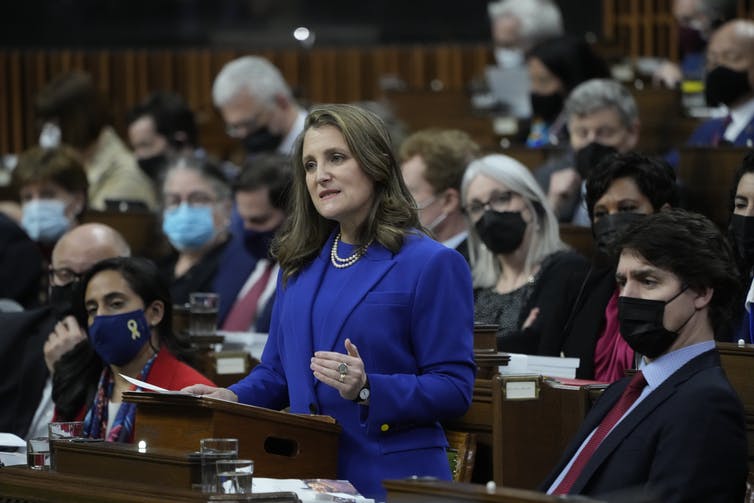
(Shutterstock)
Prime Minister Justin Trudeau recently announced plans to establish a national dental care program for low-income Canadians. The program arguably represents one of the most significant health-care initiatives since Canadian Medicare and flows from the Liberal–NDP “supply and confidence” agreement.
The program will cover an estimated 6.5 million Canadians, paying dental care fees for families making less than $90,000 annually, with no co-pays for those under $70,000. Coverage will start with children under age 12 in 2022, then expand to those under age 18, seniors and people living with disabilities in 2023, with full implementation by 2025.
Billion-dollar questions
The federal budget committed $5.3 billion for the new program, resulting in several “billion-dollar” questions, including:
-
How will the money flow? Will this be a direct federal program administered by a public agency as promoted by the NDP? Or will the money flow through traditional federal/provincial/territorial (FPT) arrangements for health care?
-
How will the national program align with other existing programs at the FPT level, let alone employer and individually sponsored dental benefit plans?
-
How will the services be delivered? In public clinics, including community health centres and hospitals, and/or through private clinics where most dental care is provided today? And what services will be covered?
There are myriad details here, but at minimum, there appears to be increasing policy, public and political consensus that access to dental care should be made consistent, reliable and equitable for all Canadians across all jurisdictions. As a result, like it is for health care, federal policy leadership is key.
Read more:
Filling the gaps: Why Canada still needs a public dental health plan despite decades of medicare
This means the federal government could establish a set of principles to guide either its own direct program or the provinces and territories in qualifying for funding.
Principles and possibilities

THE CANADIAN PRESS/Adrian Wyld
As dental public health specialists, we propose a set of principles that we hope FPT governments, the oral health-care professions, patient advocates and the public can rally around. The principles apply to both a direct program and/or traditional FPT arrangements. In any case, these are early days, but the timeline is tight, so we believe these principles can be used to facilitate efficient policy and program development.
Most importantly, we offer these principles to move forward in a healthy way: in the service of Canadians who, for far too long, have been unable to meet their oral health-care needs because of a lack of access to care.
The principles are:
-
Core basket of services. The federal government can establish a dental services schedule that is scientifically and ethically defensible. Defining this basket can help solve a pressing question in Canadian health-care policy: What is medically necessary or essential dental care? There should be a core service basket that all Canadians should have access to. Such a basket would arguably relieve pain and infection (for example, extractions), prevent disease (for example, topical fluorides), and restore physical and social function (for example, dentures). In the context of current FPT health-care arrangements, provincial and territorial programs would need to deliver this defined basket to qualify for funding.
-
Fair remuneration. Public dental programs across FPT jurisdictions can vary substantially in their remuneration rates for services delivered in the private sector. In some jurisdictions, reimbursement rates are so low that it discourages practitioners from providing the care, limiting access for those that need it most. A negotiated fee schedule should recognize this fact, as well as understand the changing realities imposed by COVID-19, which have made delivering dental care that much more expensive.
-
Public and private administration. The new program can be publicly and privately administered. Governments need not be in the business of claims-processing. Many FPT dental care programs already take advantage of the efficiencies of non-profit and for-profit claims-processors specialized in paying dental bills. Yet, to maintain accountability, public oversight of appropriate spending is important to make best use of scarce public resources.
-
Public and private delivery. Across FPT jurisdictions, publicly funded programs are delivered in private, public or combined settings. Private sector delivery currently dwarfs public sector delivery, yet both sectors are important. Leveraging the strength of both could help fill specific pockets of need, especially in a program that aims to target the unique and complex needs of medically compromised seniors and those living with disabilities.
-
Portability. One of the strengths of our Medicare system is that no one falls through the cracks when moving from one province or territory to another. The home jurisdiction maintains coverage until coverage from the incoming jurisdiction begins. This approach should apply to the new program.
-
Accessibility. Another positive aspect of Medicare is that it facilitates accessibility by not asking for any up-front costs from the patient. The new program would leverage the same principle for those whose income falls below $70,000. For those who make between $70,000 and $90,000, co-payments will apply, but they should be proportional to income. There could also be a subset of services (those deemed most important) whose costs would be completely captured by government, and then another set of services where co-pays would apply, again proportional to income.
-
Data, evaluation, and reporting. Canada does not have a well developed data infrastructure to collect, share and analyze information on oral health. As a result, public investments for dental care in Canada have gone without appropriate evaluation. This will be key for the new program given its importance, and thus investments in surveillance and/or population health assessment are required. Evaluation and, more importantly, reporting of evaluation findings should be part of accountability measures.
Funds are on the table, and we are still in the early days of resolving what is referred to as a “wicked problem.” In other words, dental care is arguably one of the most challenging, complex and underappreciated issues in health care. It is welcome news that there is now a real chance to clarify and act on this important part of Canada’s health-care system.
![]()
Sonica Singhal consults or has consulted to federal, territorial, and municipal governments, and dental regulatory authorities. She receives or has received funding from these organizations. She is affiliated with various national and provincial dental professional associations.
Carlos Quiñonez consults or has consulted to federal, provincial, territorial, and municipal governments, dental and dental hygiene regulatory authorities, dental professional associations, third-party benefits carriers, and not-for-profit agencies. He receives or has received funding from these organizations. He is affiliated with various national and provincial dental professional associations.























